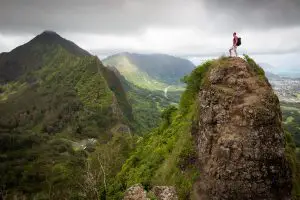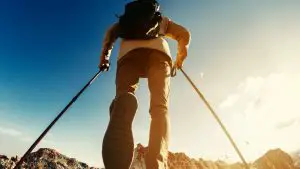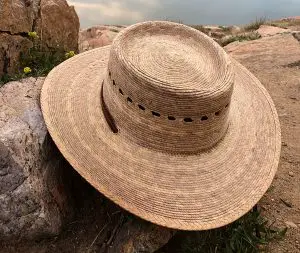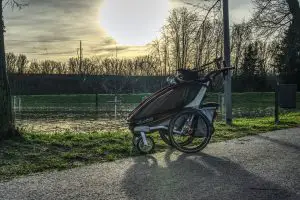Hiking While Fasting: The Ultimate Guide (2023)

People fast for numerous reasons. Whether you’re fasting for religious reasons or health reasons, there’s usually one question asked nearly every single time: Is physical exercise safe? The same goes for hiking. Can you go hiking while fasting without any consequences?
I’m obviously a big fan of hiking, but I’ve also experimented quite a bit with fasting and exercise over the years. Today, I want to delve a bit deeper into fasting, specifically with regard to hiking.
Quick Links
What Is Fasting?
So what is fasting? Simply put, fasting is the abstinence from all or some kind of food or drink for a period of time. Fasting has been around for centuries and has been used for religious, spiritual, and health reasons. Some people believe that fasting can cleanse the body and soul, and that it’s a way to connect with God or the universe. Your baseline fast will usually last anywhere from 12 to 24 hours, but some types can continue for days at a time.
During your fasting periods, in some cases, you might be allowed to consume water, tea, or even some small amounts of food, especially when you’re first starting your fasting journey. This acclimation period is crucial, so you don’t find yourself passing out from starvation or dehydration.
For the purpose of this article, we’ll be talking mainly about the physical aspect of fasting when it comes to hiking, rather than the religious or spiritual side of it.
What Are The Benefits Of Fasting?
When done correctly, fasting can offer some impressive health benefits backed by science. Here are just a few:
Weight Loss
Fasting can help you lose weight quickly because it puts your body in a state of ketosis. In ketosis, your body burns stored fat for energy instead of carbs. This is an extremely efficient way to burn calories and lose weight.
Detoxification
Fasting can help your body to detoxify. When you’re not eating, your liver has more time to focus on flushing out toxins from your system. This can improve your overall health and reduce your risk of disease.
Improved Insulin Sensitivity
Fasting can also help to improve insulin sensitivity, which is important if you’re diabetic or pre-diabetic. When your cells become more sensitive to insulin, you require less of it to maintain blood sugar levels, which can help to prevent or delay the onset of diabetes.
Reduced Chronic Inflammation
Chronic inflammation is a major contributor to disease and aging. Fasting can help to reduce chronic inflammation, which can improve your health and reduce your risk of disease.
Is It Safe to Go Hiking While Fasting?
Because of all these health benefits, it’s no wonder that people are asking about the impact of fasting on hiking. Can you still go out and enjoy a hike while fasting without any consequences?
The short answer is yes; you can go hiking while fasting with no problems. However, there are a few things to keep in mind.
If you’re new to fasting, it’s important to start slowly. Don’t go out and try to hike a 10-mile trail on your first day of fasting. Start with a shorter hike or walk and work your way up. I would start with a 1-hour or a 1-mile trail in the beginning.
Also, make sure you drink plenty of water. Dehydration is a real risk when you’re fasting, especially if you’re doing any kind of strenuous activity. Drink enough water to stay hydrated, and if you start to feel lightheaded or dizzy, take a break and drink some more. Consider supplementing electrolytes, either through a sports drink or electrolyte tablets.
Finally, listen to your body. If you’re not feeling well, it’s probably best to call it a day. Hiking is a great way to get exercise, but it’s not worth risking your health just to finish a hike.
Our bodies still require energy to get us through our physical activities. When we fast, our bodies will primarily use fat reserves for energy, which is why experts say the practice is good for weight loss. However, you should still slowly get your body accustomed to being in a fasted state before attempting any rigorous physical activities.
Intermittent Fasting While Hiking
Intermittent fasting is probably the most common and most popular kind of fasting. When you’re using this method of fasting, you typically restrict yourself to eating within a specific window during the day. The most common course of action with this type of fast is to eat within an 8-hour window and then not eat for the following 16 hours. This is typically called your “feeding window.”
Hiking while on an intermittent fasting schedule is more accessible because you know exactly when you’ll stop and start eating for the day. Then you can plan your physical activities around that time.
When I was going through my Intermittent Fasting phase, I chose to skip breakfast and start eating from around 12:00 to 1:00 PM. That meant I would stop eating between 8:00 to 9:00 PM.
So typically, I would go for a hike in the morning while in a fasted state and then work out at the gym right before my last meal of the day. I was ravenous initially, but my body eventually got used to it after a week or two.
This worked really well for me because I could still get my physical activity in, but I wasn’t fasting all day long. If you’re not used to fasting, however, I would recommend starting with a shorter window and gradually working your way up.
Water Fasting While Hiking
There are more extreme forms of fasting, with water fasting being one of them. It includes a diet of water and water only. You technically don’t have to restrict yourself to only water, but you can’t drink anything with any calories, and of course, there’s no food.
Needless to say that there are some risks you should take into account when considering water fasting while hiking.
It is highly recommended that this fast only be performed by people who already have experience with water fasting and with hiking. Also, it’s not advised to try this form of fasting when you’re out on more technical and difficult hikes. You’ll be running on a lot less energy, and that might end up causing a misstep, especially if your body is not acclimated to the combination of fasting and hiking.
Now is it completely ill-advised to go on a hike while water fasting? Not really, but you should be very well prepared and willing to break your fast if your body demands it.
Can You Go Hiking During Ramadan?
Ramadan is the ninth month of the Islamic calendar, during which Muslims fast from sunrise to sunset. It’s important to keep in mind that Ramadan is not only about fasting; it’s also a time for spiritual reflection and growth.
Can you go hiking while fasting during Ramadan? Technically, yes, you can go on a hike during Ramadan. However, there are a few things you should take into consideration.
Besides abstaining from food, you’re also abstaining from drinking water and other liquids. So, if you’re going on a long hike, it’s important to be mindful of the fact that you might not be as alert while hiking, as your body is trying to conserve energy.
Also, it’s important to listen to your body during Ramadan. If you’re feeling tired or lightheaded, it might be best to refrain from hiking or any sort of strenuous physical activity. As a matter of fact, most of my Muslim friends don’t hike or do any physical activity during the fasting hours of Ramadan.
If you decide to go hiking during Ramadan, make sure to drink enough water beforehand and break your fast with high-quality sources of protein and fat. Your body needs protein for muscle recovery, and fat can be used as energy but only in emergencies. Ideally, getting in a good source of fiber will help keep you feeling full and satisfied.
Bottom line: if you’re well-prepared and willing to listen to your body, you can go hiking during Ramadan. Just make sure you break your fast with high-quality, nutrient-rich food and drink enough water before you start fasting for the day.
Best Meals To After You Break Your Fast While Hiking
If you’re new to the world of fasting and hiking, consider some of these meals to break your fast with after your hike.
These meals are packed with protein and fiber to help restore muscle tissue, refuel your body, and keep you feeling satisfied.
Protein Shake
A protein shake is a quick and easy way to get some protein after your hike. Just mix together a scoop of whey protein powder, almond milk, banana, and ice cubes in a blender, and you’re good to go.
Turkey Sandwich on Whole Grain Bread
A turkey sandwich is another great option for after your hike. The protein in the turkey will help with muscle recovery, and the whole grain bread will provide some fiber.
Salmon Salad
Salmon salad is a great way to get in some healthy fats after your hike. The omega-3 fatty acids in salmon can help improve cognitive function and energy levels.
Quinoa Bowl
A quinoa bowl is a great way to get in some carbs and protein after your hike. Quinoa is a complex carb that will help refuel your body, and the protein in quinoa can help with muscle recovery.
Chocolate Milk
A glass of chocolate milk is a great way to restore electrolytes after your hike. Chocolate milk contains both carbs and protein, which can help refuel your body.
Conclusion
Above all, the best benefit of fasting while hiking is the feeling of reconnecting with nature. It’s a beautiful activity that allows you plenty of time to think and breathe. This can then further enable you to relax, reset, and rejuvenate, which is where the beauty of fasting can come in and heighten everything.
Just be careful because intense hiking combined with intense forms of fasting is not a great combo. Don’t feel like you have to overdo it, and always be sure to have a backup plan.
At the end of the day, fasting while hiking is a net-positive experience, as long as you are physically and mentally prepared.







